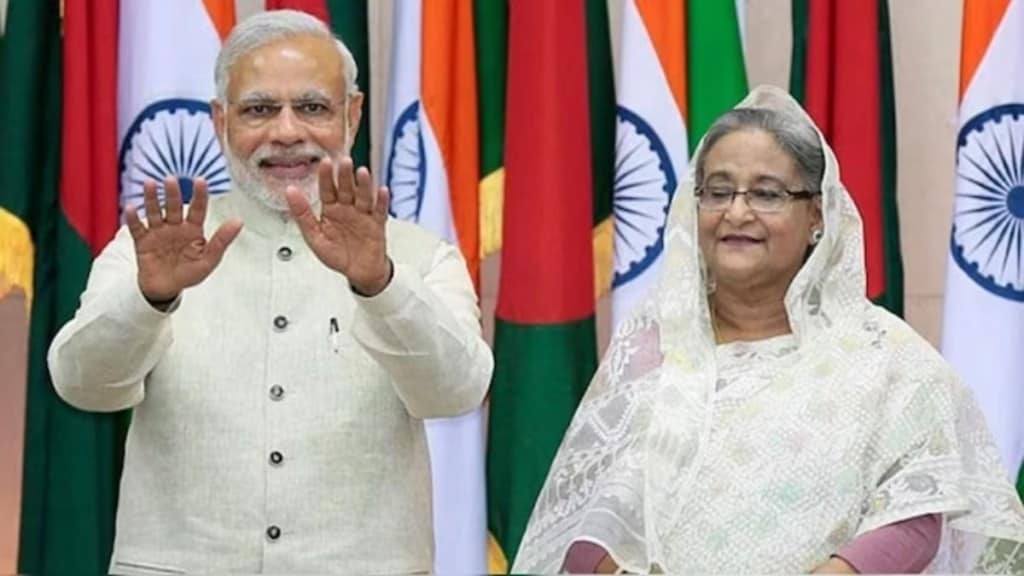Prime Minister Narendra Modi extended his congratulations to Bangladesh Prime Minister Sheikh Hasina, acknowledging her historic victory in securing a fourth consecutive term for her Awami League party. During a phone call on Monday, PM Modi underscored India’s unwavering commitment to strengthening the bilateral partnership, emphasizing the enduring friendship between the two neighbouring nations.
The recently concluded general elections in Bangladesh witnessed a remarkable triumph for the Awami League, clinching an impressive 223 seats out of the 300-member Parliament. This resounding victory not only solidified Sheikh Hasina’s political prowess but also marked her fourth consecutive term as the incumbent prime minister, a testament to the consistent support she has garnered from the electorate.
In the aftermath of this electoral success, Prime Minister Hasina expressed her gratitude for India’s long standing support, recalling pivotal moments in history such as 1971 and 1975, which served to fortify the deep-rooted bonds between the two countries. This acknowledgement highlighted the historical context that has contributed to the enduring camaraderie between India and Bangladesh.
Addressing the media in Dhaka following the election results, Sheikh Hasina reiterated the exceptional nature of the relationship with India, emphasizing the geographical proximity that makes them “next-door neighbours.” Looking forward to the next five years, she outlined a comprehensive commitment to economic progress and the fulfillment of ongoing initiatives detailed in the party’s manifesto. The overarching goal remained centered on development, both for the citizens and the broader national landscape.
Prior to the elections, Sheikh Hasina, in a significant gesture of diplomatic foresight, reassured continued cooperation and friendly relations with India in the event of her party’s victory. The party’s manifesto, unveiled with strategic precision, highlighted the successful resolution of longstanding issues such as land boundary demarcation and enclave exchange with India. These diplomatic achievements were portrayed not just as bilateral victories but as catalysts for fostering multilateral cooperation and reinforcing friendly ties between the two nations.
Delving deeper into the foreign policy priorities articulated in the manifesto, there was a notable emphasis on ongoing collaboration with neighbouring countries. The scope of this collaboration encompassed diverse areas, including cross-border communication, transit, energy partnerships, and equitable water sharing. A significant proclamation in the manifesto underscored Bangladesh’s resolute determination to prevent the presence of militants, international terrorists, and separatist groups within its borders.
A standout feature of the foreign policy agenda was the commitment to form a South Asia Task Force, signalling a proactive stance in combating terrorism and militancy in the entire region. This strategic initiative reinforced the Awami League government’s dedication to addressing security concerns and contributing to the broader stability of South Asia.
Expanding on the collaborative vision for the future, the election manifesto proposed strengthening ties not only with India but also with other neighbouring countries such as Bhutan and Nepal. Beyond traditional realms of security and trade, the vision extended to joint management of water and energy cooperation, underlining a commitment to a holistic and inclusive regional approach.
Also, by 2041, the manifesto envisioned Bangladesh’s transformation into a technologically advanced “smart” nation, highlighting 11 key areas crucial for comprehensive development. The priorities presented by Sheikh Hasina in the manifesto included a strategic focus on economic growth, employment generation, and overall comprehensive development. Job creation emerged as a focal point, aligning seamlessly with the government’s commitment to fortify the financial sector, boost agriculture and industries, control essential commodity prices, and advance technology.
Post election results
In the post-election scenario, representatives from various countries, including Russia, China, Bhutan, Philippines, Singapore, Sri Lanka, and India, expressed their continued support for Bangladesh. Ambassadors and envoys extended greetings on behalf of their respective nations, assuring ongoing support for the newly elected government. In response, Sheikh Hasina graciously thanked the diplomats, underscoring the importance of international cooperation in Bangladesh’s continued journey towards development and prosperity.
Adding to the international diplomatic engagement, a delegation of Aga Khan Diplomatic Representatives met with Sheikh Hasina, further reinforcing the global acknowledgment and support garnered by her administration. The victory in the elections, despite the boycott by the Bangladesh Nationalist Party and its allies, marked a historic achievement for Sheikh Hasina, who, at the age of 76, secured a record fourth consecutive term and fifth overall term. This positioned her to become the longest-serving prime minister in Bangladesh since its independence in 1971.


